Cooking with Toddlers and Kids: Solving Common Problems
Cooking with Toddlers and Kids is so important. If you are just starting out and need tips on how to make cooking together less chaotic and more enjoyable, check out my article, Top 10 Tips for Cooking with Toddlers and Kids. However, if you’ve been cooking together and had some sticky points arise (pun intended), I want to help you work through those problems to make your experience better for everyone. Below, I address some of the most common questions I’ve gotten from parents over the years about cooking with kids:
- What if my child doesn’t ever want to cook? How to help a child get more interested in being in the kitchen.
- What if my child hates getting messy or his hands dirty while cooking?
- What if my child only wants to cook desserts or make sweet things? Plus, what to do when your child keeps trying to eat all the ingredients.
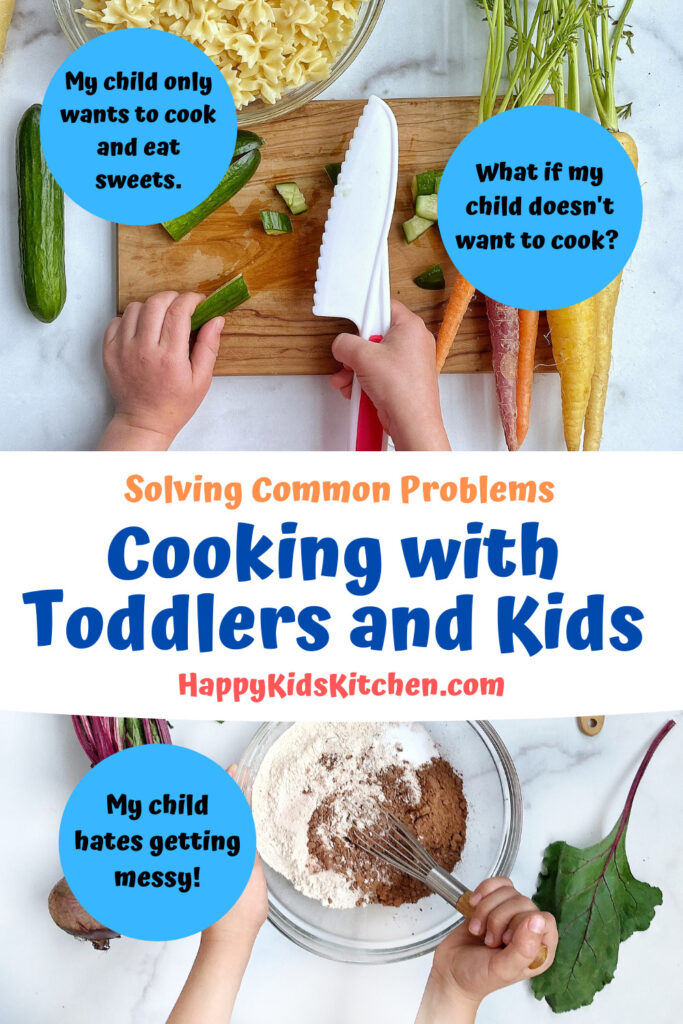
If you have other topics or questions you’d like me to cover, comment below and I’ll add them to the list.
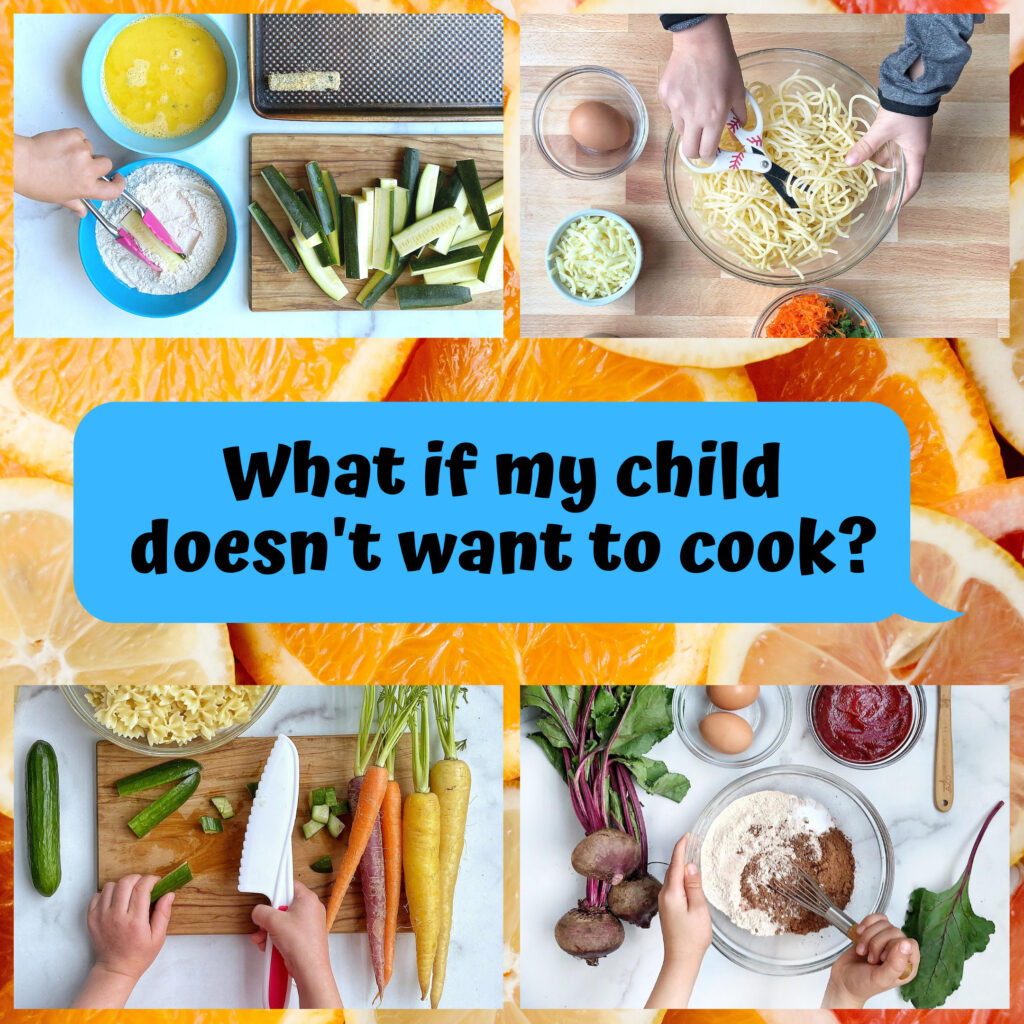
What if my child isn’t interested in cooking?
So now that you know the many benefits of cooking with your toddler or older child AND you have read how to make cooking with your little chef less chaotic and more enjoyable…But what if your child still has no interest in helping out in the kitchen?? What if you say “Hey, want to make muffins?” and your child says “No, I’d rather play with Legos”? I want to help you figure out how to start slowly introducing your child to the joys of cooking and making meals together.
First, I want you to know that kids saying “no thanks” to cooking is completely normal and happens all the time in kitchens across the world (and often in my own home too). Not every child or adult will naturally love cooking. As parents, we want to foster our child’s natural interests and abilities. However, we also want to help our kids learn habits and life skills that will set them up for a successful and happy future.
Depending on your child’s age, some of these tips will resonate more than others. However, they can all be adapted slightly to work for your family. Here are some important points to think about when helping your child get more comfortable in the kitchen:
- Don’t force it. Some kids might retreat even more if you are forceful or over-excited about getting them to cook. Take it slow. Ask your child to do the smallest things like adding a pinch of salt to a dish, getting something from the fridge for you, or washing a carrot before you peel it. Have your kiddo play in the kitchen near by while you cook and talk about what you’re doing. Your child will still learn a lot and get more and more interested in what’s going on at the stove. (More about this in the “narrate’ section below.)
Sometimes when my hands are dirty or I’m up at the stove and unable to leave, I’ll purposely ask my son for help doing another task: “Hey, Jack, my hands have chicken on them, do you think you could stir that sauce in the bowl and then bring it to me?” It’s a tricky little way to get him involved in dinner prep but one that doesn’t take much time or effort. - Focus on your child’s interests and incorporate them into your time in the kitchen together. Does your little one love fire trucks? Have a small toy on the counter while you cook together. It will make him or her more comfortable. “Can the truck drive the salt over to me with you?” Maybe your child loves rainbows…create a rainbow-themed dish such as my Rainbow Pasta Salad or Rainbow Veggie Pancakes or simply cut fruit together and make a rainbow on a plate.
Think about what kinds of things would engage your child. Do you have a child that love sensory activities? Call her over to help with a part of a recipe that’s squishy like crumbling tofu. Does your child like to decorate things or do crafts? Get artsy in the kitchen and let her top a smoothie bowl with fruit. My free ebook, Easy Snacktivities, has 8 simple recipes that help kids can get creative with their food. - Choice and Time Trade: The other day I told my older son, my reluctant chef, he could choose whatever he wanted for dinner if he at least helped make some it. He said “Ok, but you also have to do something with me that I want to do.” “Sure, that would be great,” I said. So, he helped make the dinner he chose, Pumpkin Mac and Cheese, and I played Lego Star Wars “battle” on the playroom floor with him. It was such progress! Did he do every part of the recipe or suddenly get super about cooking? No, but later the next day as he was eating leftover Mac and Cheese for lunch he said, “This is good. I didn’t realize I was such a great cook.” And I did a happy dance inside.
Anytime we can give our kids control over what they eat and cook, do it! It will help 100 percent in getting them interested and involved. : “Hey, Sara, I’d love to cook something with you. Want to look through this cookbook and pick something out to make this weekend?” “Sam, I’m thinking of making pasta for dinner. I’d love your help deciding between these two recipes.” Even if you and your child only talk about the recipe and he never actually cooks anything, that’s still progress and makes it more likely he’ll be interested in being in the kitchen later on. - Narrate and be excited! Our enthusiasm rubs off on our kids. Talk about being excited to try a new recipe and why: “I love broccoli and I’m so excited to try this new chicken and broccoli stir-fry for dinner tonight.” Narrate what’s happening while your cooking and celebrate your small wins: “This sauce smells so good…I think it’s the ginger and garlic I added.” Narrating what we are doing in the kitchen also lets us secretly teach cooking skills: “I’m making sure this pan gets hot before I add the chicken…that way I know the outside will get nice and browned.” “I’m leveling this cup of flour and making sure it’s full and flat on top…I don’t want to get too much or too little flour in the cookies because the recipe has the right amount for it to taste good.”
- Also talk about our own struggles and challenges in the kitchen: You might not love to cook. That’s ok. But I’m sure you can find little things that you were proud of: “I’ve never made this recipe before and I’m a little nervous about how it’s going to turn out. Look, I prepared the vegetables for that new recipe…I’m feeling prepared to give it a try. Oops, I burned the sauce, that’s so frustrating but messing up is part of learning…I’ll make a different one.” Your child might be nervous about learning a new skill or cooking when he hasn’t done it before. Showing your own ups and downs will illustrate resilience.
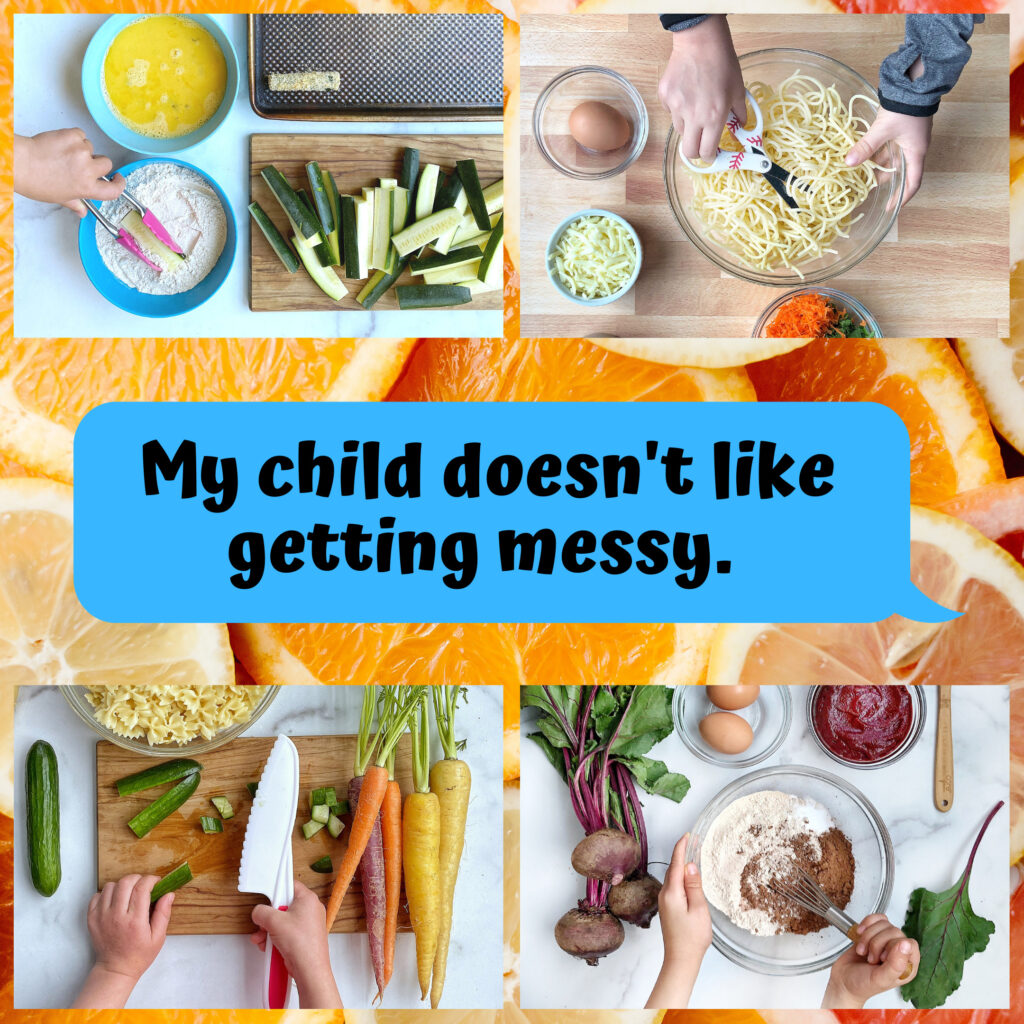
Does your child hate getting his hands messy or wet?
That’s so common, especially with toddlers and more apprehensive eaters. Here are some things to think about:
- Resist the urge to wipe. We often wipe our kids hand or faces before they are done eating or playing. Wait if you can until your child is ready to move on to the next thing. That being said, it’s also helpful to give your child his own dish towel to use whenever he needs to wipe his own hands.
- Use tools. Don’t force your child to touch things if he doesn’t want to. You can find other ways for him to participate in cooking, such as using small tongs to transfer food from a cutting board to a bowl or using a long wooden spoon to stir ingredients. See my favorite cooking tools for kids HERE.
- Get curious. Ask you child questions about how things feel: “Here’s some salt. What does it feel like in your hands?” Keep reminding your child the messy part will just take a little while: “We can wash our hands when we are done…it’s ok to be messy for a little bit.”
- Do sensory play together. You child might be extra sensitive to food play, so maybe start getting a little messy in other areas. Squish some play dough or create a sensory bid out of stale cereal. My favorite Instagram account for sensory play ideas is @mothercould . Check it out for some great ideas.
- Go slow and keep at it. I want to reiterate that any amount of time or activity in the kitchen is beneficial. Just keep trying with tiny little steps and you’ll make process over time.
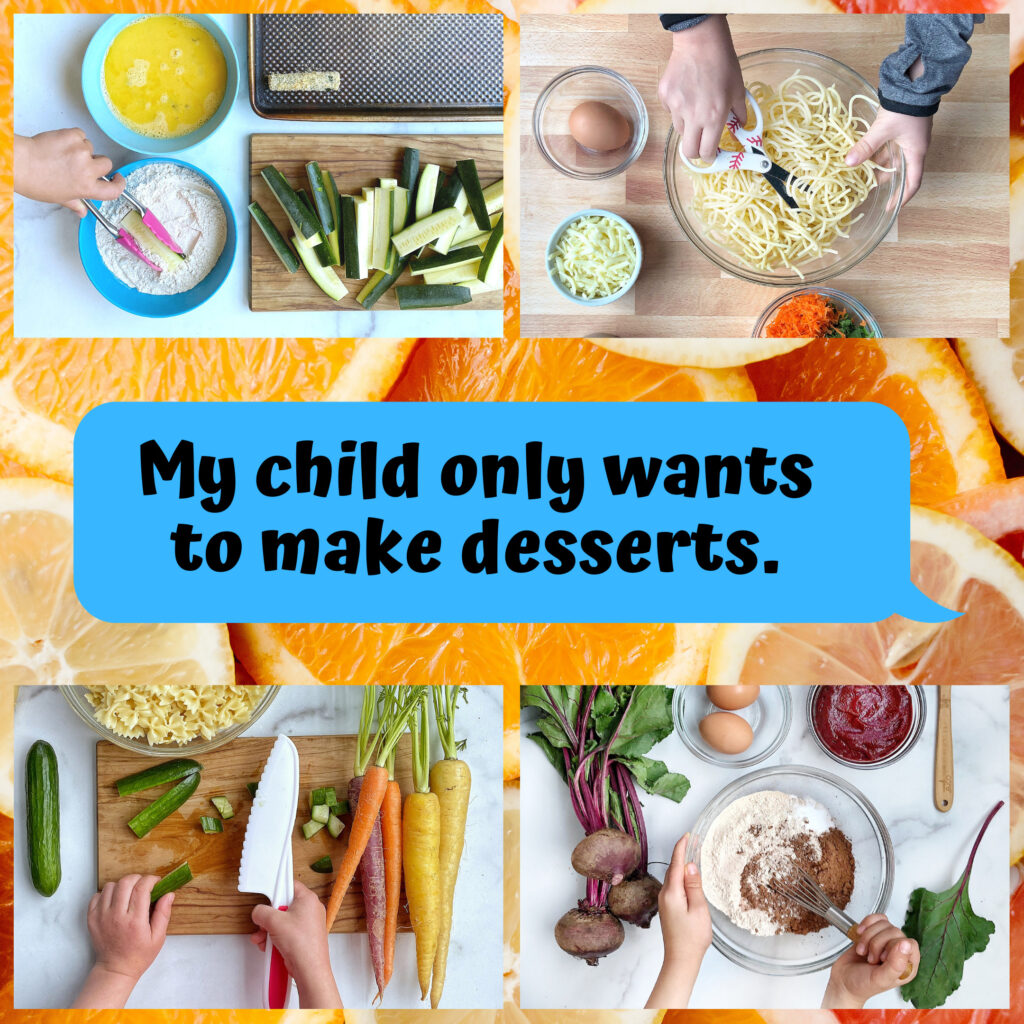
What if my child only wants to cook sweet things or bake desserts?
Hey, me too! Haha. No, but really, this is so common. Kids love sweets and baking together is a great way to get your child interested in being in the kitchen with you. However, it’s important to branch out into savory cooking at some point because we cannot survive on cookies and muffins alone. (Although our kiddos would like to.) I would suggest reading the section above about getting kids more interested in cooking. Start slowly having your child help with everyday cooking. Even washing one carrot or sprinkling a pinch of salt into a pot will give your child the positive feedback that will lead to wanting more time in the kitchen cooking all kinds of things.
Child always sneaking chocolate chips or trying to eat all the ingredients while baking? Again, totally normal! We all do it, right? However, it can get tricky when cooking with ingredients that aren’t safe to taste, such as raw eggs. I have two things that can help:
- Have a healthy snack available while cooking. If you child if reaching for the flour or other unsafe ingredients while cooking, say something like “I know those things look interesting and you want to try them. I like that you’re curious about food. But those foods might make your belly hurt and my job is to keep you safe. You can eat the apple I cut up for you if you’re hungry. We will eat the cookies when they are cooked and safe to eat.”
- Make a “tasting bowl.” This is a small bowl or container that you can add a small amount of things that are safe for your child to taste if he or she would like to. I use this very often when we are making something with chocolate chips. I don’t want my kids eating the whole bag of chocolate chips and I also want to make sure we have the accurate amount called for in the recipe. So, I give each of my boys some chocolate chips in a small bowl of their very own. “These are your chocolate chips to eat when you’d like. The ones in the measuring cup/bag are for the recipe.”
Have a different problem that comes up while you’re cooking together? Comment below with specific situations or questions you have! Not sure how to incorporate your child’s interests into cooking? I’m happy to help you brainstorm the best ways to get your child in the kitchen with you. Reach out anytime through email or a direct message on my Instagram account @heather.happykidskitchen
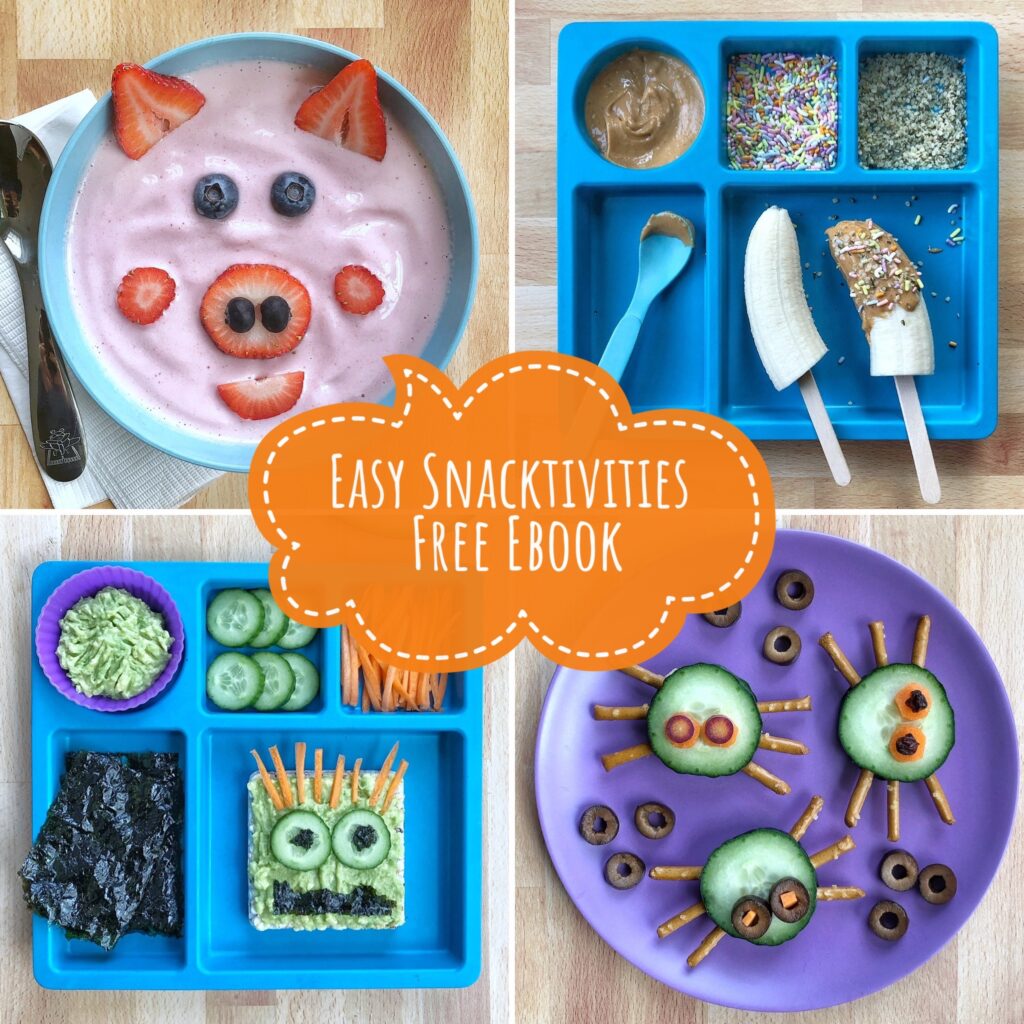 Need recipes to get your kiddos interested in cooking more?? Check out my free ebook, Easy Snacktivities. There are 8 simple snack recipes to help kids interact with their food and learn to like new things.
Need recipes to get your kiddos interested in cooking more?? Check out my free ebook, Easy Snacktivities. There are 8 simple snack recipes to help kids interact with their food and learn to like new things.
